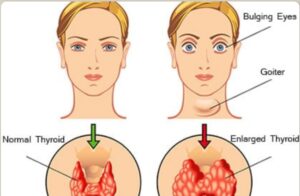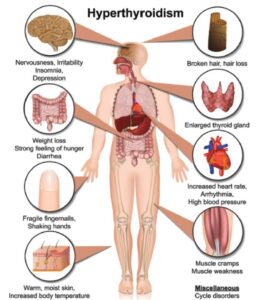What is hyperthyroidism?
Hyperthyroidism, also known as overactive thyroid, occurs when the thyroid gland produces an excess of hormones beyond what the body requires. The thyroid is a small, butterfly-shaped gland located at the front the neck. Thyroid hormones regulate the body’s energy, impacting nearly every organ, including the heart’s rhythm. An overproduction of these hormones accelerates many of the body’s functions.
Who is more likely to develop hyperthyroidism?
Hyperthyroidism is more prevalent in women and individuals over the age of 60. You are at a higher risk of developing hyperthyroidism if you:
– Have a family history of thyroid disorders.
– Suffer from other health conditions, including:
– Pernicious anemia, a condition caused by vitamin B12 deficiency.
– Type 1 or type 2 diabetes.
– Primary adrenal insufficiency, a hormonal disorder.
– Consume large amounts of iodine-rich foods .
– Use iodine-containing medications.
– Use nicotine products.
– Have been pregnant within the past six months.
What causes hyperthyroidism?
The thyroid gland produces two primary hormones: thyroxine (T-4) and triiodothyronine (T-3). These hormones influence every cell in the body. They regulate the rate at which the body metabolizes fats and carbohydrates, help maintain body temperature, affect heart rate, and control the production of proteins.
Hyperthyroidism occurs when the thyroid gland releases excessive amounts of these thyroid hormones into the bloodstream.
Hyperthyroidism has several causes, including:
– Graves’ disease
– Overactive nodules
– Inflammation of the thyroid gland, known as thyroiditis
– Excess iodine intake
– Overuse of thyroid hormone medication
– A benign tumor of the pituitary gland
What are the symptoms of hyperthyroidism?
Hyperthyroidism, which accelerates metabolism, lead to several uncomfortable symptoms. Common indications include:
- Losing weight without trying.
- Fast heartbeat, a condition called tachycardia.
- Irregular heartbeat, also called arrhythmia.
- Pounding of the heart, sometimes called heart palpitations.
- Increased hunger.
- Nervousness, anxiety and irritability.
- Tremor, usually a small trembling in the hands and fingers.
- Sweating.
- Changes in menstrual cycles.
- Increased sensitivity to heat.
- Changes in bowel patterns, especially more-frequent bowel movements.
- Enlarged thyroid gland, sometimes called a goiter, which may appear as a swelling at the base of the neck.
- Tiredness.
- Muscle weakness.
- Sleep problems.
- Warm, moist skin.
- Thinning skin.
- Fine, brittle hair.
When you first get hyperthyroidism, you may feel energetic. This is because your metabolism is speed up. But over time, this increase in your metabolism can break your body down and make you feel tired.
What are the complications of hyperthyroidism?
- If left untreated, hyperthyroidism can lead to severe health complications, including:
Some of the most serious complications of hyperthyroidism involve the heart, including:
A heart rhythm disorder called atrial fibrillation that increases the risk of stroke.
Congestive heart failure, a condition in which the heart can’t circulate enough blood to meet the body’s needs.
. It can also impact the eyes. Symptoms of thyroid eye disease:
- Bulging eyes.
- Gritty sensation in the eyes.
- Pressure or pain in the eyes.
- Puffy or retracted eyelids.
- Reddened or inflamed eyes.
- Light sensitivity.
- Double vision.
-
Thyrotoxic crisis -Symptoms may include:
- Fever.
- Fast heartbeat.
- Nausea.
- Vomiting.
- Diarrhea.
- Dehydration.
- Confusion.
- Delirium.
-
problems menstrual cycle and fertility issues
Hyperthyroidism Risk Factors
Individuals are more likely to develop hyperthyroidism if they meet any of the following criteria:
- Assigned female at birth (AFAB)
- Aged between 40 and 60 years
- Family history of hyperthyroidism
- High iodine intake through diet or supplements
- Pregnancy
- Certain chronic health conditions may also increase the risk, including:
- Type 1 diabetes
- Addison’s disease
- Pernicious anemia

